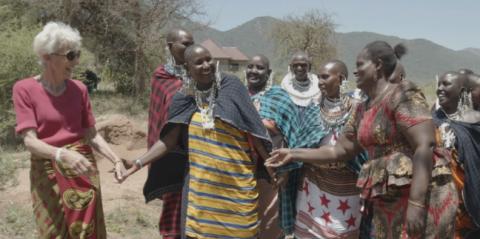
A potentially dangerous stand-off has erupted in north-central Tanzania after the government decided to evict up to 167,000 pastoral Maasai from their land in favor of a wealthy hunting firm owned by the United Arab Republic’s ruling family. This article was published in the July-August 2022 issue of NewNotes.
The Ngorongoro Conservation Area (NCA) is one of the premiere wildlife preservation and tourist areas in the world, located in the eastern part of the Serengeti ecosystem that annually experiences the migration of wildebeest and other animals following the rainy seasons and search for forage. The Maasai nomadic cattle-herders inhabited that area going back centuries but when the government set up wildlife reserves (popularly known as game parks) the Maasai were removed from the park areas. Some twenty or thirty years ago small numbers were allowed to return to live within park boundaries, as they harmoniously co-exist with wild animals.
In 2013 the government tried to evict the Maasai from the NCA, claiming their presence detracted from tourists’ wildlife experience, but this was prevented by international pressure. In 2018 the East African Court of Justice (EACJ) ruled in favor of the Maasai’s right to live in their ancestral areas in and just outside the conservation area. Furthermore, Tanzania is a signatory to the United Nations Declaration for the Rights of Indigenous People (UNDRIP), which insists on the principle of free, prior and informed consent. A Maasai spokesman has said: “We want the Tanzania government to immediately stop the plan of evicting us from our ancestral land and wait for the court case to be determined.” The Maasai have again appealed to the EACJ, which is expected to issue a ruling at the end of June.
Despite the 2018 injunction against removal of Maasai from this area, the Tanzania government has apparently decided that the enormous amounts of revenue from wealthy Arab oil barons to serve their desire to hunt animals in Tanzania take precedence over the rights of indigenous people to live peacefully in their ancestral lands. The new plan envisions the NCA being divided into four zones, with 82% of the land for conservation use only. Multiple human/wildlife use will be restricted to only the remaining 18%. This would force the removal of 97,000 people living within the NCA and another 70,000 living in Loliondo Division outside the NCA. Ironically, at the same time that the government calls for expulsion of Maasai from these areas, it issued a report stating that indigenous people protect wildlife from poachers.
In early June many Maasai gathered in several places in Loliondo to protest the government decision and were confronted by armed members of the para-military Field Force Unit (FFU), who are known to be quick to use their weapons to put down protests. On June 10 the FFU fired on Maasai protesters with live ammunition and tear gas, injuring 30 and killing one policeman. Observers fear more violence.
Anuradha Mittal, Executive Director of the Oakland Institute, which follows land alienation issues in Africa, said: “Despite earlier pauses, the Tanzania government is blindly moving ahead with plans to remove Maasai pastoralists out of their land to clear the way for trophy hunting. International mobilization on these developments is imperative to help stop this disastrous and illegal move.”
Expropriating the lands in Africa from the indigenous people for economic purposes is nothing new and can be dated back to the Dutch settlement in South Africa in 1652, which eventually led to White (Afrikaner and British) settlers owning 85% of the land, followed by similar dispossession of indigenous lands in many countries of sub-Saharan Africa for European settlers, large plantations, or industrial enterprises.
It is not only loss of land that is a matter of concern. The expropriated land is almost universally used for mono-cropping versus the indigenous system of multi-crop sustainable farming, export of agricultural crops rather than producing nutritious, organic food high in grain fibers, and profit accruing to only a few executives or share-holders of the companies which engage in the international trade of these commodities, while the local African people are paid extremely low wages. Furthermore, massive removal of indigenous trees replaced by plantation trees or crops has led to invasion by harmful vectors and spread of diseases.
The United Nations Human Rights Council has expressed alarm at the June 10th incident and stated: “We call on the Tanzanian Government to immediately halt plans for relocation of the people living in Loliondo and the Ngorongoro Conservation Area and begin consultations with the Maasai Indigenous Peoples, including direct contact with the Ngorongoro Pastoral Council, to jointly define current challenges to environmental conservation and best avenues to resolve them, while maintaining a human rights-based approach to conservation.”
The time has come for African governments to put the rights of their own indigenous people over any financial gain coming from wealthy foreigners.
Image: Maryknoll Sr. Sue Rech (left) works with a group in Tanzania that helps promote food security, holistic development, and social justice.
